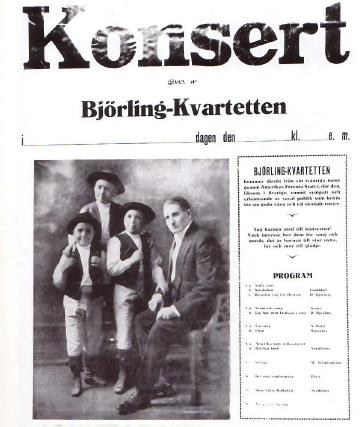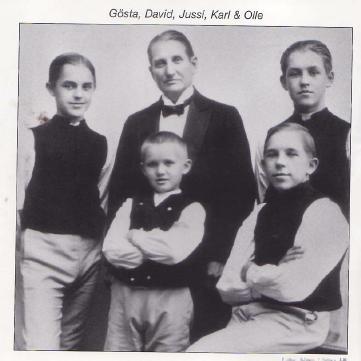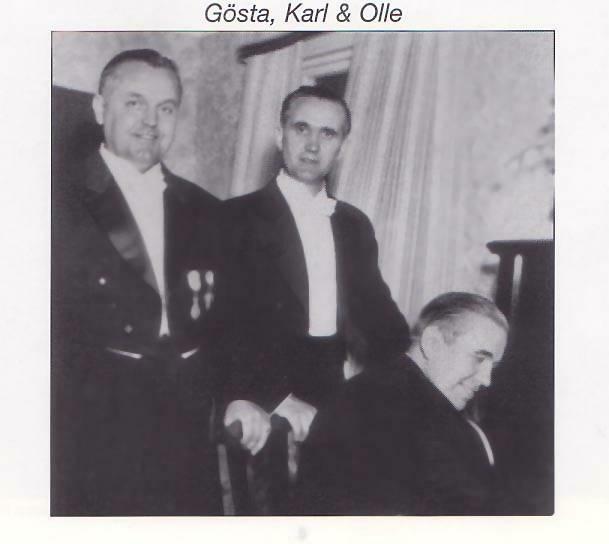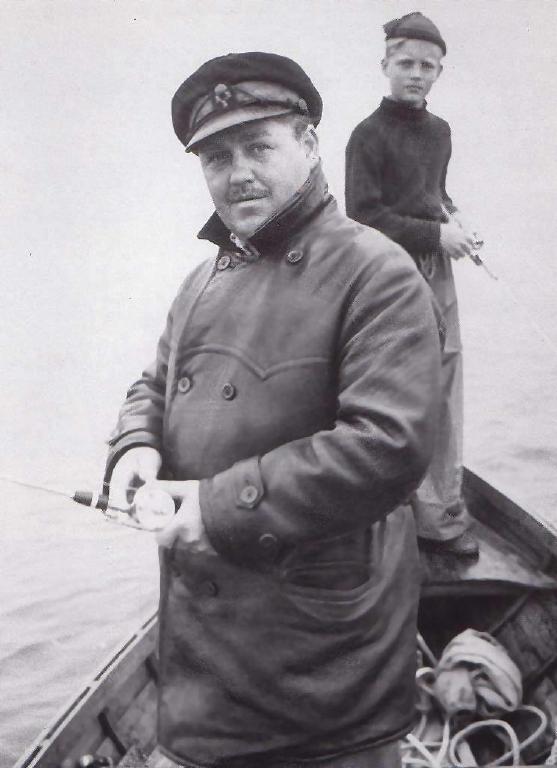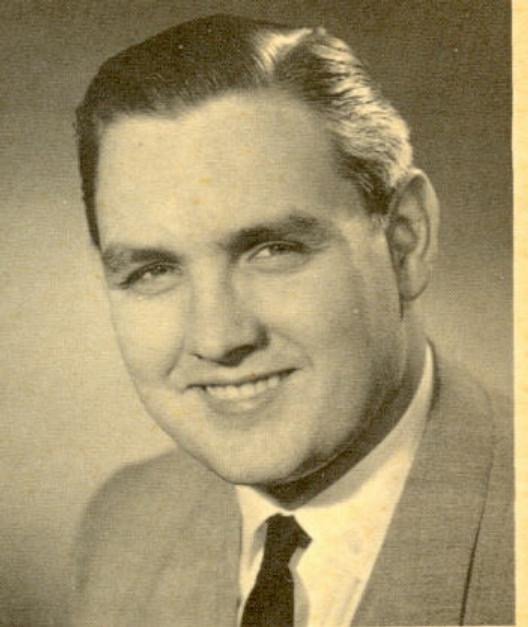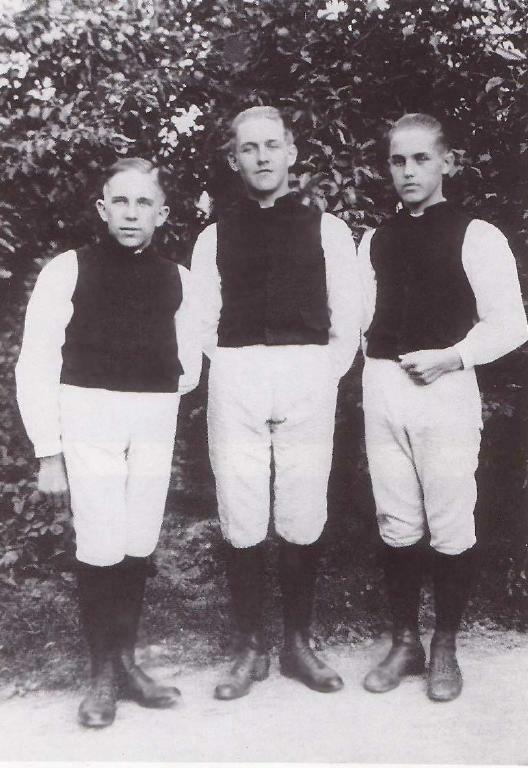The Björling family business
David Björling (16 November 1873 Strömsbruk – 13 August 1926 Västervik) was a blacksmith and a mechanic, who emigrated to the USA, where his voice was discovered. He had it trained and tried to build a tenor career. After returning to Sweden, he sang a few years in concert and in minor opera houses, but failed to get a foodhold in the business, so he gave up and worked as a voice teacher, establishing his own method. Above all, he concentrated on schooling his sons Olle, Jussi and Gösta for a career in music, already from a very early age; Olle could sing scales before he could intelligibly speak! Their Björlingkvartetten (Björling Quartett), where David sang together with the boys, gained a certain prominence in Sweden and the US.
Olle, officially Olof Björling (2 May 1909 Stora Tuna – 12 April 1965 Stockholm), had a career as a concert tenor in Sweden. As a child, in the Björlingkvartetten, he and not Jussi had been the lead singer!
The only baritone in the family, Karl (1911–75) never sang in public in adult age; as a child, only for a short time, in the Björling Quartet with his three tenor brothers, replacing their father David after his death.
Gösta, officially Gustaf Björling (21 September 1912 Stora Tuna – 9 October 1957 Stockholm), started singing in public, with the Björlingkvartetten, when he was 3 years old. Later on, he studied first at the Stockholm conservatory as a baritone, then with Fernando Carpi in Milano, who made him a tenor. Upon return to Sweden in 1937, he first sang main roles in Göteborg (Marouf, Arrigo in the Swedisch premiere of Les vêpres siciliennes), but his voice did not quite carry over the orchestra, so he went back to Italy for further study. In 1940, he made his debut at the Royal Opera House Stockholm, where he would spend the rest of his career. He started as Rodolfo, Lyonel and Almaviva, but was then mostly used for character parts like Vašek, Borsa, Don Basilio, Pedrillo, Monostatos, Missail, Mime, David, the Four Servants or Ruiz. In 1949, he sang Don Ottavio, in 1952 Duca, and in 1954 Turiddu. He dropped dead while still quite young at the airport in Stockholm.
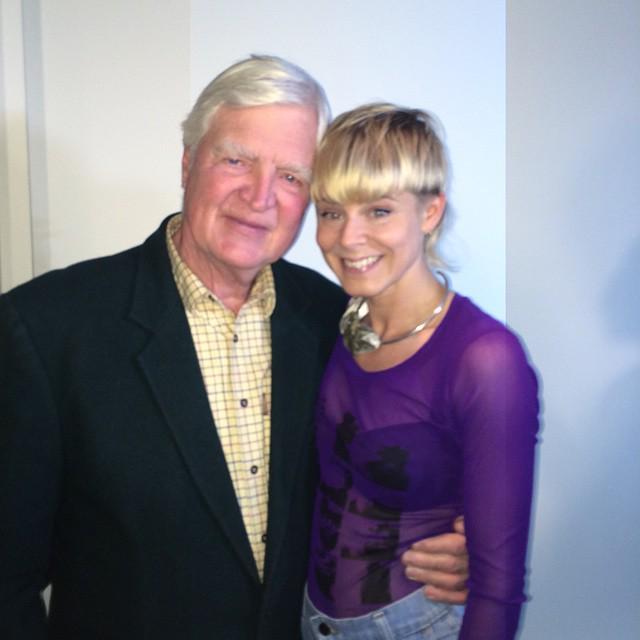
Lars Björling (born 1939), Jussi's youngest son, was a tenor's son rather than a tenor in his own right. This description seems perilous, and the typical result in such cases is fringe singing of the worst kind. Lars Björling's case is no exception, and yet at the same time it is one. Although he had apprehended the basics of vocal technique from his father and his uncle Olle, he didn't think of properly studying voice until quite late. He never appeared on stage, but since the late 1970s he gave some public concerts, often in the context of Jussi Björling commemorations; and he issued no less than eight CDs with his private recordings, the purpose of all that being defined by those CDs' title: "A tribute to David Björling". Lars had realized that the vocal school of his grandfather David (whom he had never met) was the foundation of the whole Björling success; and he wanted to hand down to future generations what he had learned about that vocal school: likeable and pretentious at once.
His most important roles were Manrico, Radamès, Calaf, Cavaradossi, José and Florestan.
Reference 1, reference 2: Kutsch &
Riemens
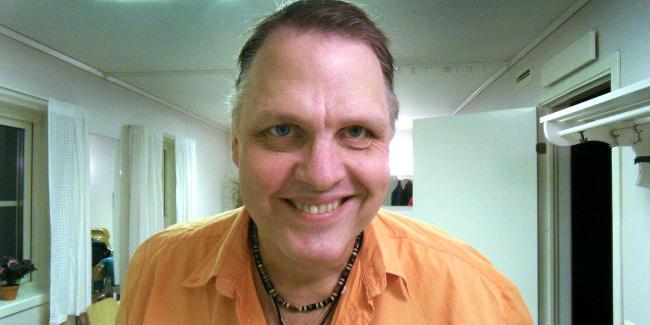
It's funny that wherever Raymond Björling was announced or quoted, the
epitheton ornans "opera singer" was like his second Christian name – although in fact, he almost never sang in opera. The
only performance with him that I've been able to trace was Massenet's Don Quichotte in 1984, when he was still a student, with
the semi-professional Stockholms Musikdramatiska Ensemble.
There may have some more operatic appearances, but primarily, he sang
musical at the Oscarsteatern and the so-called Cirkus (a charming old multi-purpose event venue) in Stockholm, he sang on TV,
he sang a lot of pop and rock (what he had really wanted, according to himself, was to become a pop singer), he sang at weddings
and funerals... anything but opera. As far as classical music, he performed it regularly at the (astoundingly numerous) Jussi
Björling memorial concerts that were also the realm of his uncle Lars. And he was positively horrible in classical music,
though quite good at interpreting Elvis songs.
As time went by, he had to earn money as a printer,
a cook, and eventually worked in a café in Uppsala. Of course, always with the term "operasångaren" glued to his
name.
Reference 1; reference 2; reference 3: Upsala Nya Tidning, 28 April 2016; reference 4; reference 5 and picture source: Hallands Nyheter, 23 February 2011
I wish to thank Thomas Silverbörg for the pictures and records. |
